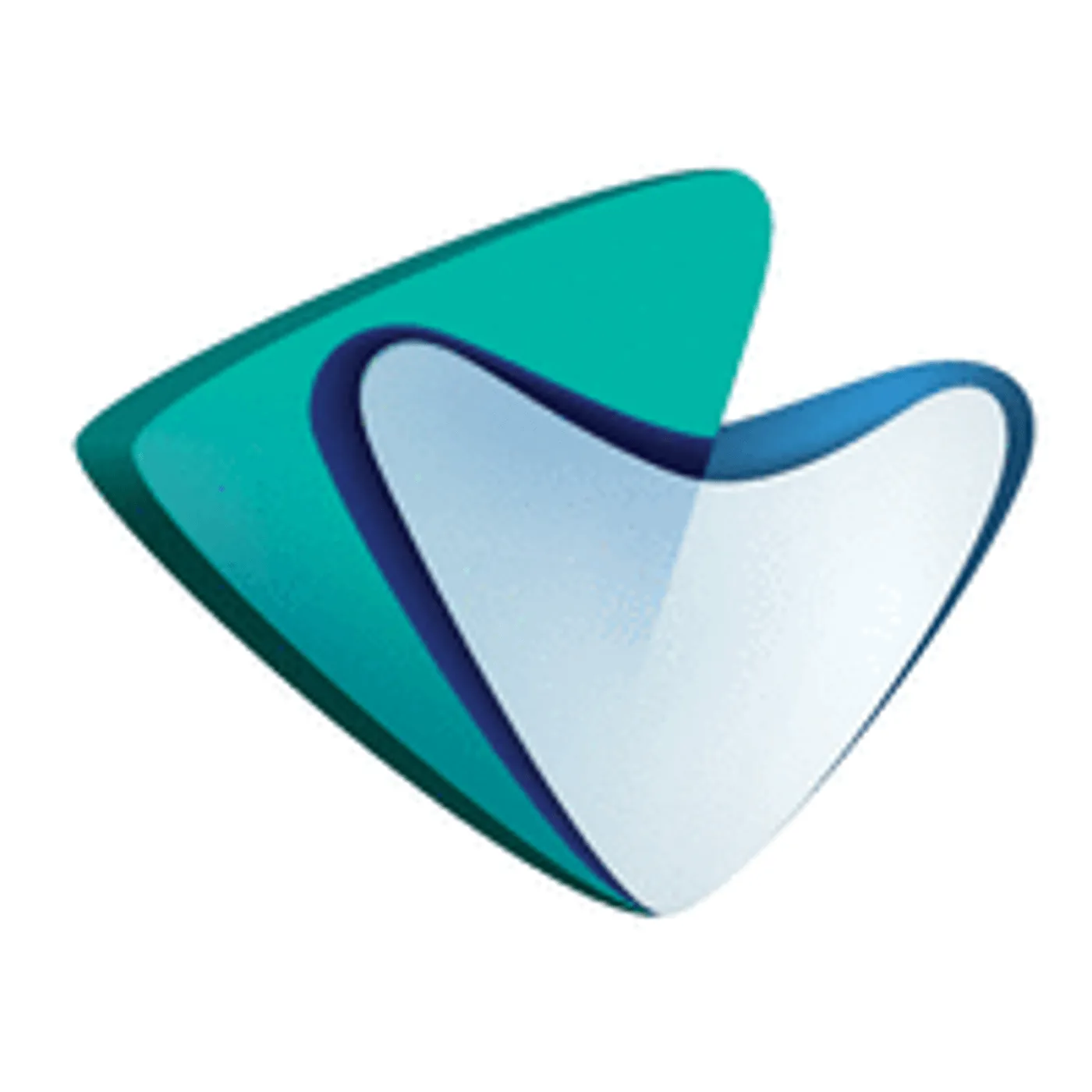The Role of IoT in Healthcare Industry: Benefits and Use Cases
Updated 18 Aug 2023
13 Min
8444 Views
Healthcare is getting smarter with tech innovations — from robots-surgeons to smart hospitals. Internet of Things takes patient care to a new level. It optimizes workflows for healthcare providers and doctors through medical IoT devices.
A lot of hospitals have already started investing money in technology adoption. For example, Saratoga Hospital invested in IoT-enabled technology for patient monitoring to reduce administrative tasks and improve clinical outcomes.
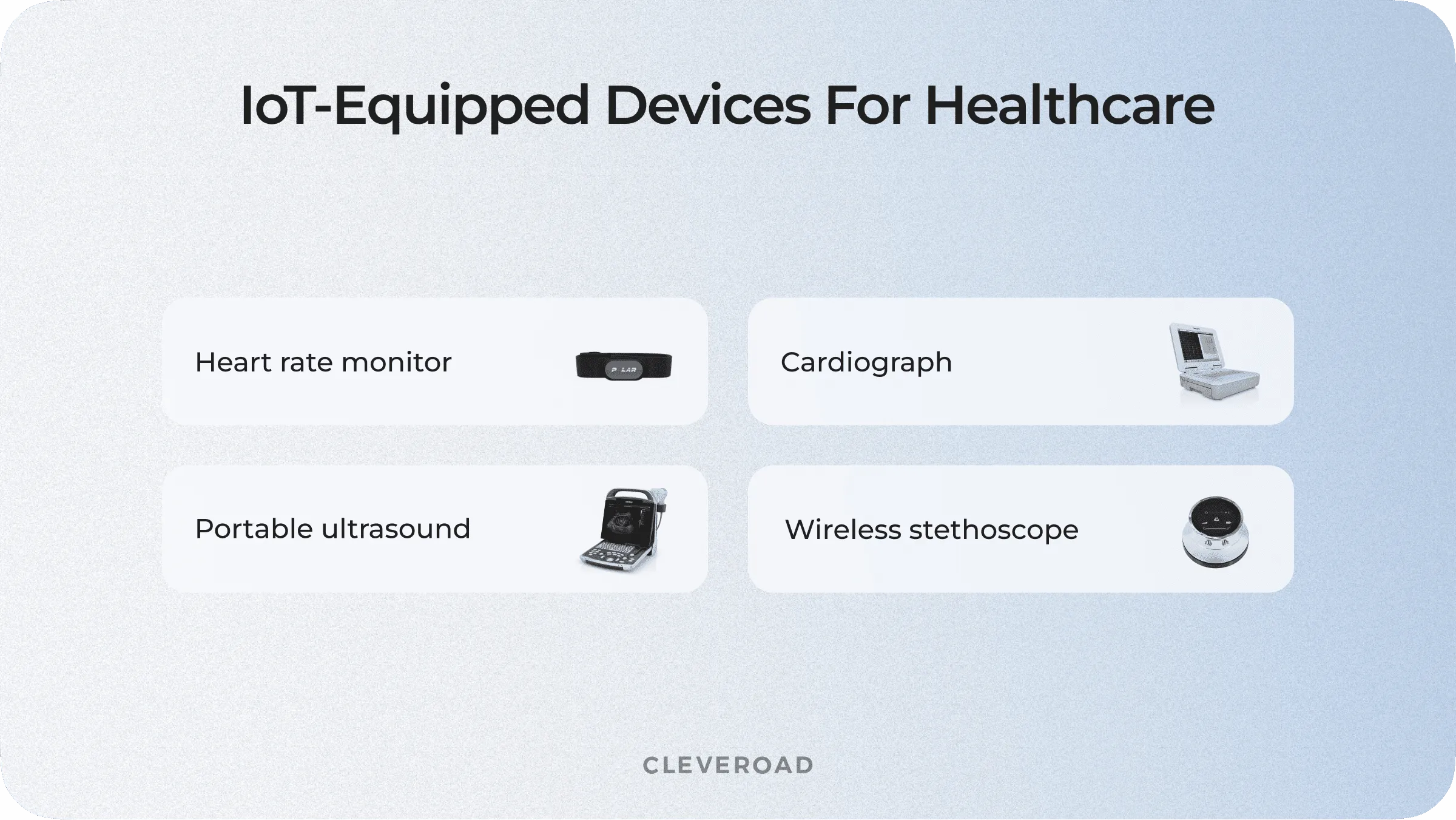
IoT use cases in healthcare
To help doctors and patients, the medical IoT is being actively integrated into hardware and software for medical needs (as well as during healthcare website development). Our purpose is to tell you more about this helpful technology, particularly detailing what is IoT in healthcare, its use advantages, challenges and more.
What is IoT in Healthcare?
It’s hard to find an industry with more potential for IoT than healthcare. According to the latest IoT in healthcare statistics , particularly GrandViewResearch report concerning global IoT in health domain, the market of the medical Internet of Things will reach $534.3 billion by 2025. Most hospitals (73%) that integrated Internet of Things, saw a rise in rapid diagnosis.
Let's look through such a technology usage example to find out more as to the matter. Creating a mental health app, you can integrate IoT in medicine via wearable sensors to enable monitoring patients' emotional well-being and enhance care about them in your medical establishment.
IoT medical devices that use data from sensors offer a lot of benefits on all levels, starting from in-patient treatment and health condition monitoring to early diagnosis. And it's not the full list of such a technology benefit for healthcare. IoT healthcare software can gather data from patients and process it automatically, detecting precursors of disease and helping to prevent it's progression in the early stages.
Internet of Medical Things (IoMT)
Connected devices offer a lot of opportunities to healthcare industry. Experts claim the Internet of Medical Things, or IoMT, will reach $136.8 billion by 2021. However, what’s important are the IoT health care benefits for doctors and patients.
So, what is IoMT, and how it benefits the modern health establishments? Andrew Keller tells about the essence of the Internet of Medical Things the following way:
Andrew Keller
Western Connecticut Medical Group
IoMT stands for devices that can collect and exchange data — either with users or other devices — via the internet, and are used to allow doctors to be more aware of a patient’s condition on real-time basis.
The primary function of IoMT is monitoring patients' conditions and notifying the doctor in case of an emergency.
IoT in medical and healthcare fields can include a lot of things like wearable devices, drug tracking system, medical supply chain, remote patient monitoring software, and more.
IoMT can help increase the accuracy of diagnoses due to constant monitoring of health changes. Applications equipped with IoT in medical field help users stay connected to the doctors or nurses. They make working processes more efficient for healthcare workers who support a lot of patients.
Five Main Benefits of IoT in Healthcare
Internet of Things and healthcare gain more popularity every year. It means that such a solution has several vital benefits. Let’s discuss them more precisely to dive deeper into the value of healthcare Internet of Things.
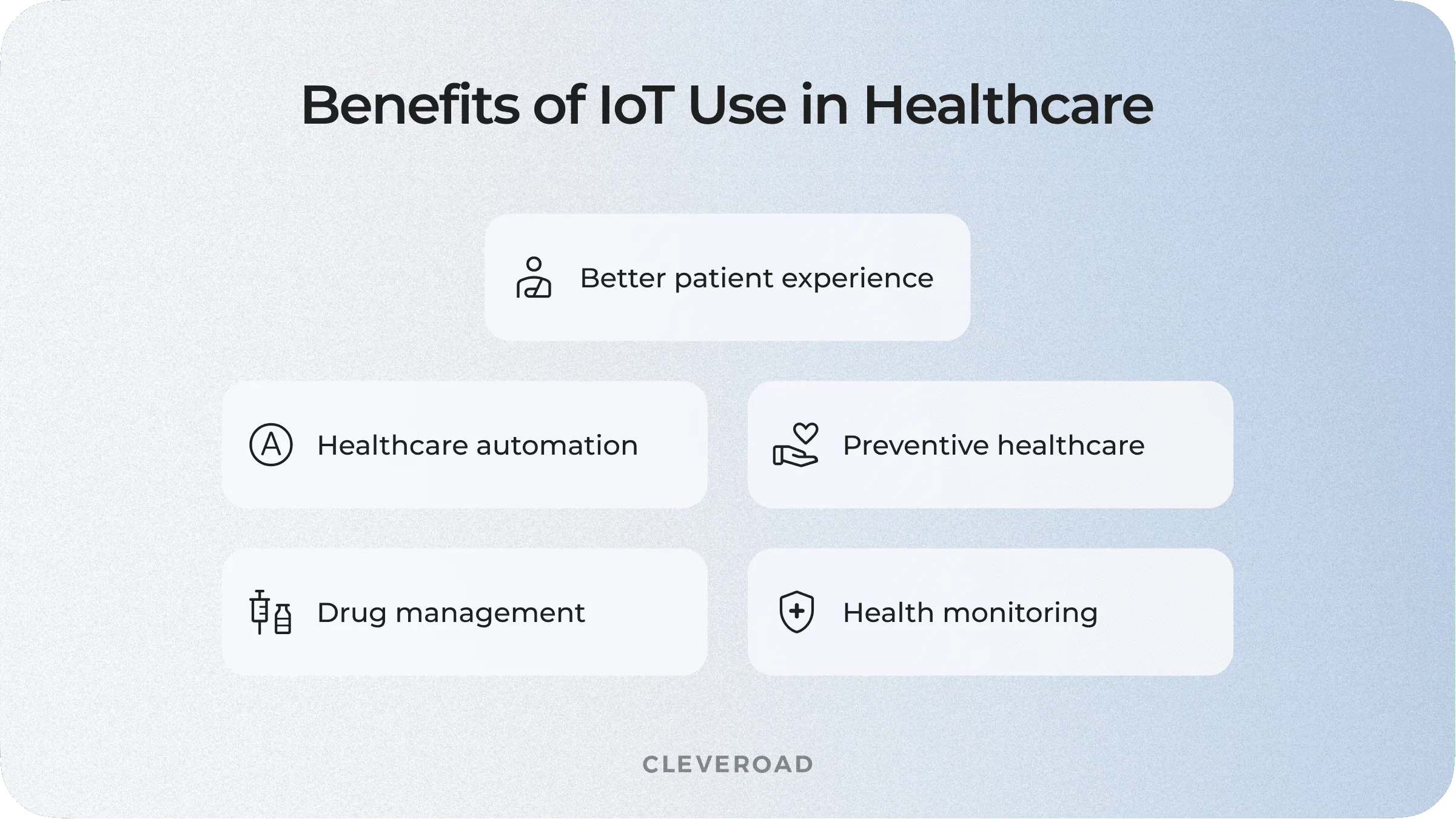
Use benefits of IoT in healthcare
Health Monitoring
Smart devices can track health conditions. IoT applications for healthcare can send an emergency signal if the patient has an asthma attack, heart failure, or another medical issue.
For example, Apple has integrated an IoT technology in healthcare to Fall Detection System in Apple Watch. It detects if the user falls and shows an alert. The person needs to tap ‘I’m OK’ for one minute. In another case, AppleWatch calls emergency services. They also send a message to emergency contacts.
Better Patient Experience
IoT in hospitals improves the healthcare system, gives patients a more comfortable way to get in touch with doctors. It leads to improving patient experience and gaining customer loyalty. Thus, the IoT in healthcare industry helped the US (Mt. Sinai Medical Center) reduce the waiting time for 50% of their emergency patients using AutoBed software.
The hospital has approximately 1,100 beds, but admits at least 59,000 of patients. The primary task of AutoBed is matching available beds with new patients. This way, IoT devices in healthcare assist the hospital in the efficient accomplishment of the set goals.
Drug Management
One of the Internet of Things healthcare benefits is better drug management. IoT technology allows controlling the amount of taken medicine. Doctors can monitor the dose and track effectiveness of treatment.
Also, the Internet of Things allows sending reminders to patients when they should take their drugs. In some cases, it’s possible to notify the family member when the patient hasn’t taken medicine on time.
Healthcare Automation
IoT devices can help automate administrative, manual, and routine tasks. Internet of Things medical applications can analyze a significant amount of information and create different metrics to see any changes in the patients’ health conditions. Automated processes of collecting data can reduce the number of errors in making diagnosis.
Preventive Healthcare
A lot of people die from chronic diseases such as heart disease, diabetes, and more. Using the analytic capabilities of IoT, it’s possible to provide patients with more personalized forms of treatment and care.
Smart, Connected or Wearable IoT devices for healthcare can monitor condition of elderly or patients with chronic diseases. Having all that data, doctors will be able to give a better treatment and see the first symptoms of the disease.
We've looked only through the most common benefits of the Internet of Things technology. According to them, the role of IoT in healthcare is to enhance patients' well-being through modern technologies as well as boost physicians' work through the IoT-equipped medical devices.
How else to enhance your healthcare app with the cutting edge technologies? Our article about Big Data in Healthcare app development will help you - start reading!
Challenges of IoT in Healthcare
As we see, the Internet of Things seems to be incredible and can revolutionize the healthcare sector. But there are some pitfalls connected to the whole IoT healthcare devices list you shouldn’t ignore.
Data Security
The main problem of IoT for healthcare is poor security. Data privacy is significant for the medical industry since medical history is confidential information. Malefactors may try to get access to the company's software and expose sensitive data. However, the skilled medical software development vendor can effectively protect your future IoT-equipped app from any harmful actions of the third parties.
To avoid such issues, it’s necessary to focus on data security when you make use of IoT in healthcare. Certainly, such a necessity will lead to additional costs.
There are also such papers as GDPR and CCPA that protect personal information of patients on IoT connected healthcare applications. Keep in mind that being compliant to the said regulations will help your app not only provide the sensitive data from being stolen, but also protect you from heavy fines.
Integration of Protocols
IoMT connects a lot of different IoT health devices. To create a flexible ecosystem, healthcare requires using the functionality of many devices with various protocols. However, there is no single solution regarding communication protocols and standards. As a result, the integration of IoT in the healthcare industry is quite slow and limited.
Creating medical software, you should make sure that your app is HIPAA and HITECH compliant. These protocols contain a lot of rules and regulations connected to processing patients’ personal information, and in order to facilitate such a compliance, you can apply to one of the healthcare IoT companies having the in-depth expertise in such an integration and helping you successfully deal with the said issue.
Data Overload
An IoT healthcare device collects and processes a lot of information. As a result, doctors can face data overload and accuracy issues. The enormous amount of information on the Internet of Things healthcare applications can lead to difficulties in decision-making during treatment.
IoT Use Cases in Healthcare
MarketWatch estimates that the Global Internet of Things in medical field is expected to grow at a valuation of approximately $162.2 billion by the end of 2024.
IoT in healthcare and medical services allows saving time and improve customer experience. No wonder that a lot of enterprises like Google and Apple invest resources into the Internet of Things technology.
Let’s discuss three primary use cases of the Internet of Things as well as examples of existing IoT solutions in healthcare on the market.
#1. Hospital Information Management System (HIMS)
IoT medical software and devices brings a lot of changes to hospital management systems.
HIMS collects and manages such information as medical records, data about doctors and patients. This Internet of Things health care system provides up-to-date information about appointments, hospital rooms, and so on.
Hospital Information Management System brings several significant benefits to the healthcare sector:
- Easy search of documents;
- Remote access to patients’ records;
- High-security level;
- Drug management;
- Improved patient experience, etc.
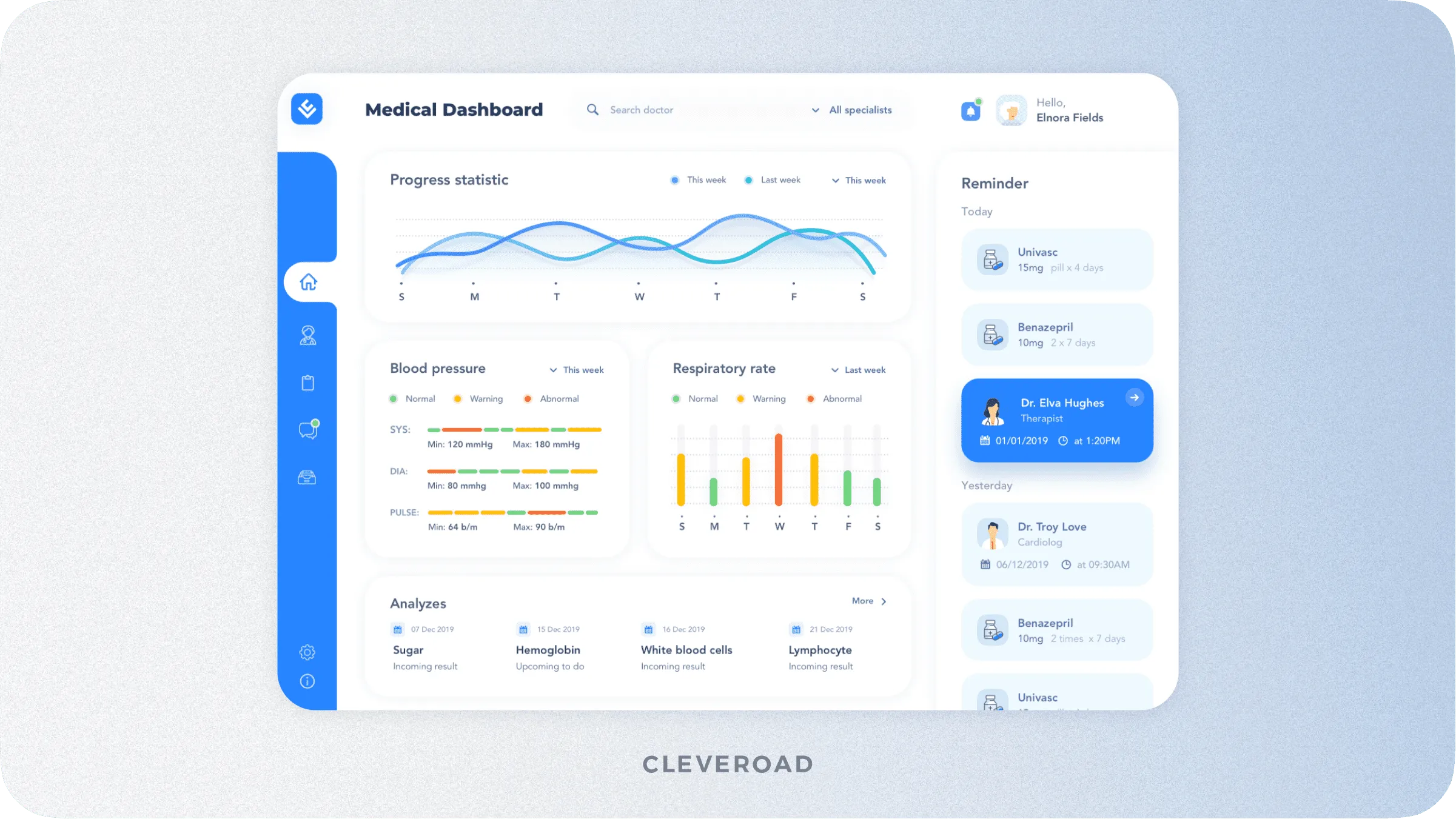
Information management system by Cleveroad (Source: Dribbble)
Cleveroad has also an experience of medical information system's creation. IoT sensor integrated with such a health platform can collect a patient data (e.g., blood pressure, sugar, hemoglobin, etc.). It even sends an alert to nurses or doctors in case the said indicators are insufficient. Such a function helps them to give an in-time medical help to sick person.
A lot of IoT healthcare companies offer ready-made Hospital Information Management Systems. They can be used on various devices to provide easy access to the records. Among these IoT in healthcare examples of the platforms are:
- Aarogya
- eHospital
- eVisit
- myNapier
- Insta HMS
#2. Electronic Healthcare Records System (EHR)
The next of the Internet of Things healthcare examples is an Electronic Health Record (EHR) system.
Electronic Health Record (EHR) is a system built to provide authorized users with real-time information instantly and securely.
EHR healthcare and IoT systems not only store information about patients. They can also share data among different facilities to achieve better treatment results.
Electronic Healthcare Records systems tend to offer various benefits to the healthcare sector for doctors and patients. For example, due to systems equipped with Internet of Things for healthcare purposes, doctors get instant access to the latest tests of the patient. Moreover, they can see the full disease history. As for the patients, they can contact doctors 24/7 through solutions for healthcare in IoT sphere that is important for patients with chronic diseases.
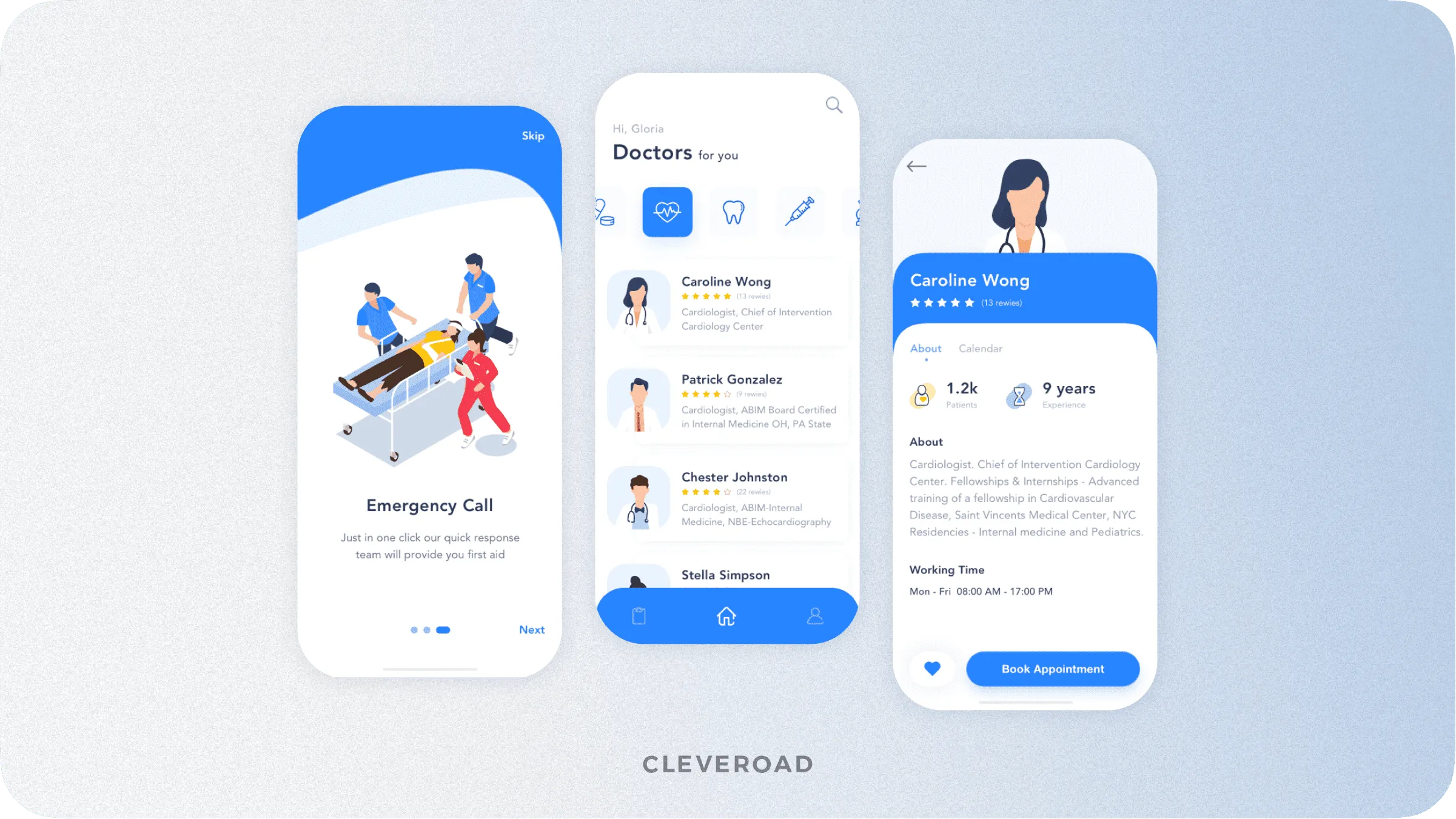
Hospital mobile app by Cleveroad (Source: Dribbble)
Hospital mobile app created by Cleveroad can help patients and physicians easier find each other. Moreover, IoT integration to such an app is also significant: for example, it can assist doctors in tracking patients with mental diseases to know their condition and offer help as soon as possible.
#3. Mobile Healthcare
Such IoT smart healthcare solutions are aimed at the patient experience enhancement. The App Store and Google Play offer approximately 320,000 mHealth, according to IQVIA. mHealth mobile application development services gives a lot of opportunities like getting consultation online, scheduling the offline consultation, and more.
Explore how mHealth app development can improve patient's care
It’s possible to use mobile healthcare IoT applications in two cases — for emergency or regular treatment. Apps connected to wearables tend to collect data about physical activity or health conditions. Moreover, it’s possible to create apps for healthcare IoT devices (namely, wearables) that can transfer the data to smartphones. The examples of such apps are shown on the below image.
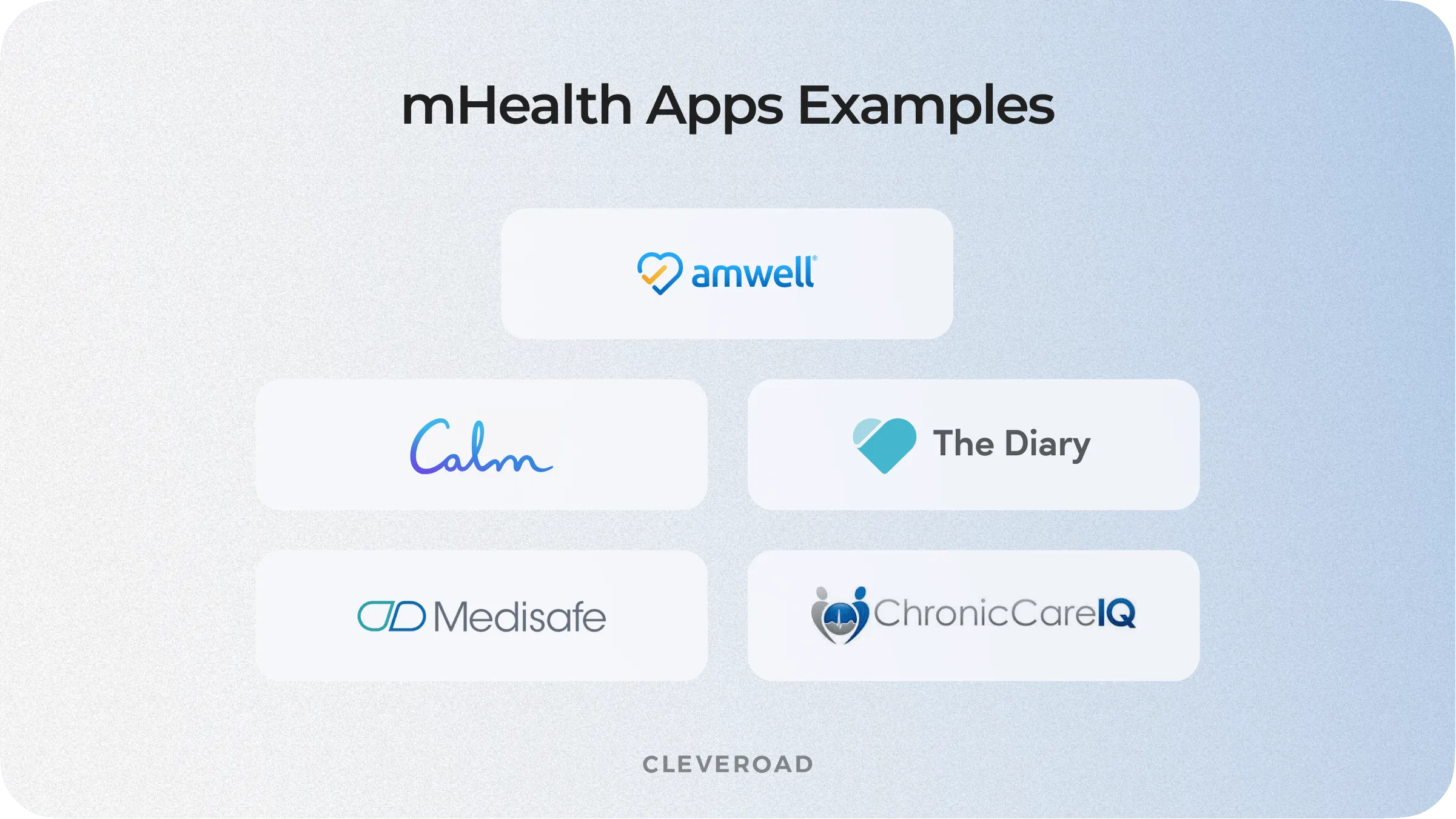
Internet of Things in healthcare: examples of apps
There are several types of mHealth apps:
- Meditation applications
- EHRs
- Sleep tracking applications
- Fitness apps
Of course, there are more ways to use the Internet of Things in healthcare:
Wearables
These health IoT gadgets (including widely known fitness trackers or smart watches) continuously monitor the daily activity of patients, and they can inform about steps taken, burnt calories, heart rate, etc. In order to gain the said purposes, physicians and patients also apply to other gadgets like EKG graphs or customized sensors from medical suppliers.
Patient-oriented medicine
IoT helps to determine the real goals and problems of patients, and adapt medical care to them. All this is performed with the help of daily measurements made on medical device (IoT based) or several of them, and the output of statistical indicators.
Medical assets monitoring
IoT helps medical employees spend less time on routing and management tasks. Specialists will be able to spend more time with patients due to the improvement of medical assets monitoring and managing them. So IoT and healthcare can be mutually beneficial for each other while tracking data from health assets (e.g., range of platforms and equipment for medical purposes from hospitals, clinics, etc.).
Remote health monitoring
Remote (or distant) patient monitoring is the process of using technology to monitor sick people in non-clinical settings such as the household. It should not be surprising that remote health monitoring is becoming more and more popular because it has the ability to greatly improve consumers' quality of life when used in the management and treatment of chronic diseases.
Special IoT healthcare devices and custom software make it possible to read data from medical cards of patients in a real-time. They allow doctors to conduct analysis, send notifications to suppliers and patients.
More information about the remote patient monitoring platform is represented in our guide! Check it out to consider all the details!
How Cleveroad Can Help in Medical Solutions Creation
Cleveroad is a software development company from CEE region. We create solutions for the healthcare industry. Our team of software developers has a rich background in creating scalable applications following the business requirements and goals.
Our team have accomplished a lot of successful healthcare projects. We want to represent our job on the example of one of our created solutions - an IoT-based platform called Hydrostasis that allows to track a level of human hydration in real-time.
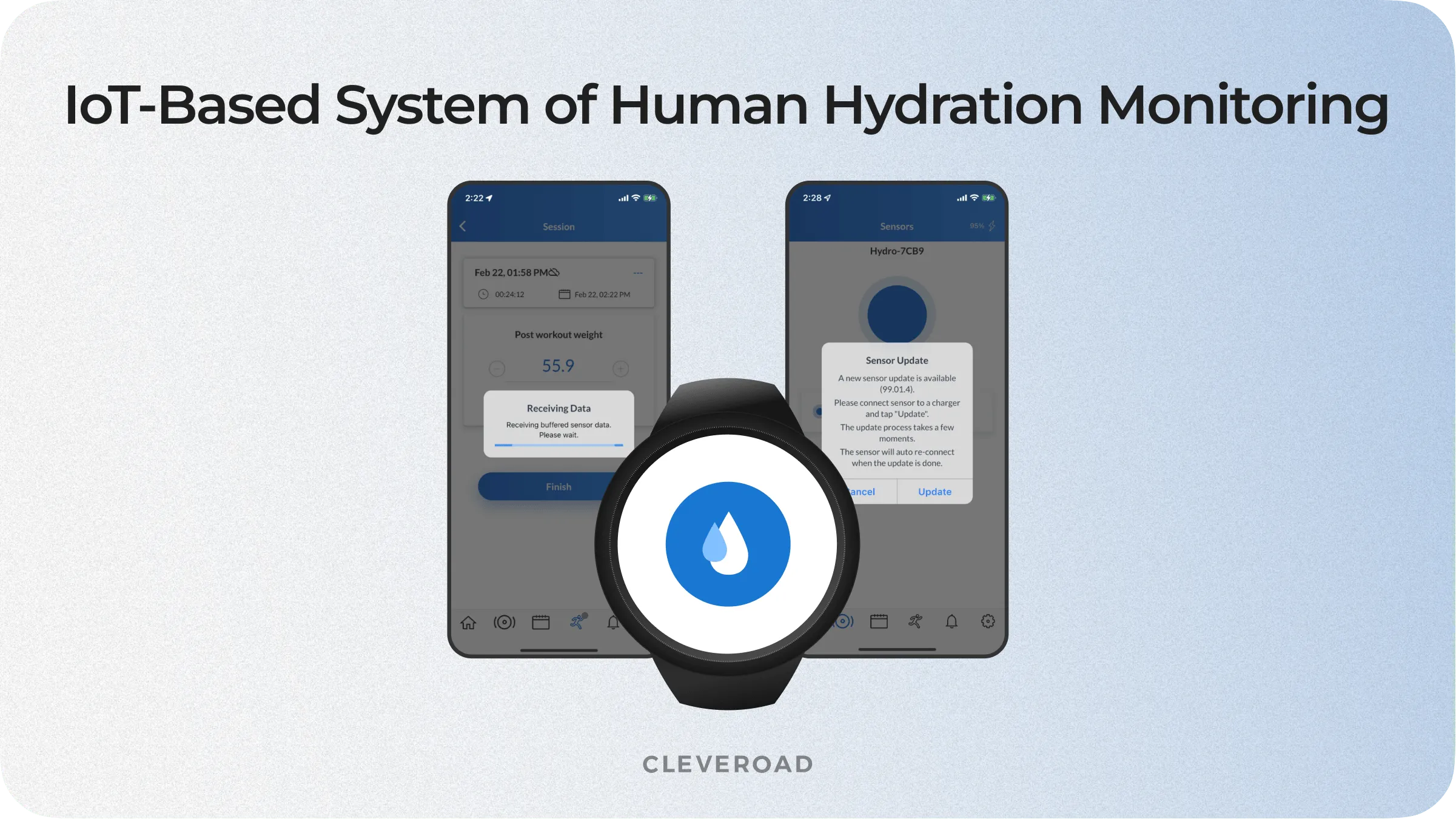
IoT-based Hydrostasis system from Cleveroad
We've created a cross-platform system totally covering the business logic of a customer solution and showing hydration tracking flows represented in accordance of data collected with the help of the IoT sensor.
The hydration monitoring system made by our experts includes the mobile solution integrated with IoT sensor and the web-based admin panel used to manage the hydration tracking data as well as customer info. Dealing with the sensor data is performed with the help of ML algorithms and Big Data.
The created system was helpful for our clients to broaden the audience reach, expand the partnership campaign, and perform many other helpful activities to boost the establishment performance. We can also create a full-fledged medical system for your needs, which will help your healthcare facility raise to new heights. All you need is just to contact us and start cooperation.
Order help from a skilled vendor
Message us to obtain support in healthcare app development matching the needs of your establishment!
There are three primary use cases of IoT in health care:
- Hospital Information Management System (HIMS) collects and manages such information as medical records or the data about doctors, patients.
- Electronic Healthcare Records System (EHR) tracks electronic records of patients’ health conditions. Such systems provide real-time information instantly and securely to authorized users.
- mHealth apps (as ones of IoT healthcare examples) can be used in two cases — for emergency or regular treatment.
The primary function of IoMT is monitoring patients' conditions and notifying the doctor in case of an emergency. IoT in medical and healthcare fields can include a lot of things like wearable devices, drug tracking system, medical supply chain, remote patient monitoring, and more.
IoT technologies in healthcare offer a lot of benefits on all levels, starting from in-patient treatment and health condition monitoring to disease prevention and early diagnosis. IoT health software can gather data from patients and process it automatically, detecting precursors of disease to prevent it's progression in the early stages.
The combination of the Internet of Things and healthcare creates several vital benefits.
- Health monitoring. There are various IoT devices in health care like smartwatches that track health conditions constantly.
- Better patient experience. The technology gives patients a more comfortable way to get in touch with doctors.
- Drug management. IoT technology allows controlling the amount of taken medicine.
- Healthcare automation. IoT devices (healthcare) can help automate various administrative, manual, and routine tasks.
- Preventive healthcare. Using the analytic capabilities of IoT, it’s possible to provide patients having chronic diseased with more personalized forms of treatment and care.
There are several ways to use the Internet of Things technology in the healthcare industry.
- HIMS collects and manages medical records or data about doctors, patients.
- EHR tracks electronic records of patients’ health conditions. Such systems provide real-time information instantly.
- mHealth apps can be used in two cases — for emergency or regular treatment.
- Remote health monitoring.
- Wearables.
- Patient-oriented medicine.
- MediSafe
- ChronicCareIQ
- Amwell
- Calm
- Diary Health App

Evgeniy Altynpara is a CTO and member of the Forbes Councils’ community of tech professionals. He is an expert in software development and technological entrepreneurship and has 10+years of experience in digital transformation consulting in Healthcare, FinTech, Supply Chain and Logistics
Give us your impressions about this article
Give us your impressions about this article
Comments
2 commentsIoT is marking its major industrial revolution in today's world. Healthcare industries are one of those benefited from implementing the Internet of Things. With the help of IoMT, the health monitoring of patients has become much easier for the intensivists working in critical care departments. Healthcare Automation has also made a vast difference in maintaining the patient's medical health records by creating different metrics. IoT uses in healthcare is the most remarkable one ranging from HIMS to EHR and Mobile Healthcare which is put down in the most informative way possible in the blog. Many software application platforms are helping to avoid burnout which is most commonly observed among doctors and physicians nowadays. It is very interesting to know how Cleveroad company is helping with making solutions for the healthcare industry. Thank you for the useful blog.

Thank you for the feedback!
This article is very useful for us

Thanks)
